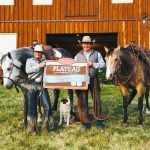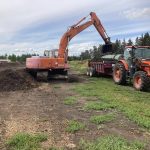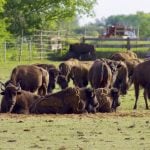The recent article in Time proclaiming cows as the new coal must have been discouraging to ranchers and beef farmers, never mind the segment on CBC’s The Current that included cutting red meat as a way to fight climate change.
At one point on The Current, Lloyd Alter, who has a background as an architect and real estate developer, talked to a couple about everything from how they could make their house greener (makes sense, given his background) to cutting red meat from their diet. I’m not sure why Alter thinks he’s qualified to give anyone advice on what they should eat, but he joins a long list of armchair experts on this subject.
The man in the segment pushed back a bit. “I can put vegetables on my bacon cheeseburger,” he said.
Read Also

Labour strife and packing plant concentration
I’m sure I’m not the only one feeling a little sick this week watching the deteriorating negotiations between Cargill and…
I found this whole exchange very interesting. Obviously, this guy did not want to cut red meat from his diet, and why should he? To this man, I say: “Enjoy your cheeseburger, sir, and don’t let anyone guilt you about it.”
Ridding one’s diet of red meat is not going to prevent climate change. After all, a cow ain’t coal. Unlike fossil fuels, a cow is part of a cycle that not only emits greenhouse gases, but also sequesters them. Well-managed grazing by cattle maintains the health of grassland ecosystems, and in wooded areas, it can reduce the risk of forest fires. Plants sequester carbon, and legumes such as alfalfa not only sequester carbon, but fix nitrogen, reducing the need for fertilizer application. Also, cattle are magnificent at turning forage from land that can’t produce other crops into nutritious food for those of us who appreciate a good cut of beef.
Of course, I’m preaching to the choir here. Canadian Cattlemen is not widely read by people outside the beef industry. So, the question is what can you, as a rancher or farmer, actually do about this narrative?
Anyone interested in reaching out to the general public should consider the resources already at hand. For example, the Canadian Cattlemen’s Association recently revamped its Beef Advocacy Program, an online course that helps people effectively interact with the public and teaches the best ways to use social media. The updated program takes about three or four hours to complete. The Beef Cattle Research Council also has a lot of great information available online, if you’re looking for research to share. The film Guardians of the Grasslands seems to resonate with a lot of people, having the right mix of fact and passion.
If you’re now, or ever have been involved with the Young Cattlemen’s Council (YCC) or Cattlemen’s Young Leaders (CYL) program, watch your inbox over the next few days for an invitation to a virtual event we’re co-hosting in the new year with the YCC/CYL. We’ll be looking for feedback from young beef industry leaders on editorial, but Alexis Kienlen of Alberta Farmer Express and I will also be talking about how to work with media and answering questions from the group.
Beyond that, if you’re really interested in being available to the media, I’d suggest finding a media outlet or reporter you want to work with. Then read/listen to/watch their work so you’re familiar with it, and reach out, in a polite but confident way. Try to pick journalists you’d like to build a relationship with, just as you would with others in the beef industry.
You can’t control the narrative of the story, but you can be seen as a credible source, and journalists are always looking for credible sources. Farmers and ranchers still have quite a bit of credibility with the general public, and so that is in your favour.
I think the other thing in a rancher’s favour is that many people are tired of armchair experts telling them what they should and shouldn’t eat. We should be able to enjoy our food without feeling like we’re sinning in some way. There are more than a few people like that guy on The Current who enjoy an occasional bacon cheeseburger, after all.
I hope all our readers are able to do this over the holidays, as they sit down to enjoy their Christmas dinners, whatever they may have on their plates.














